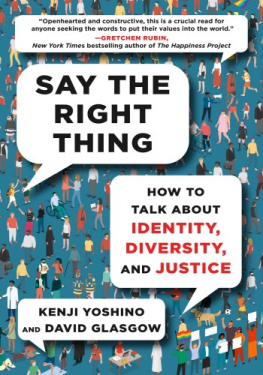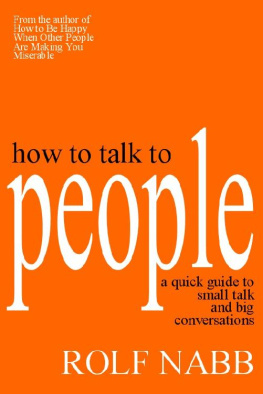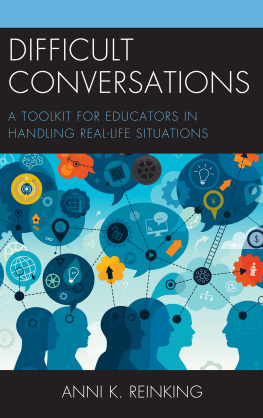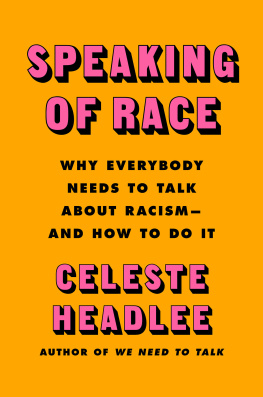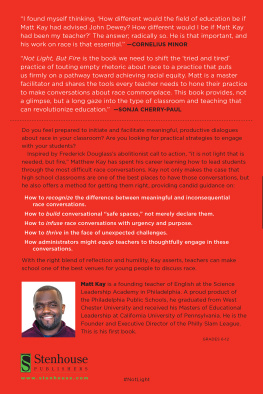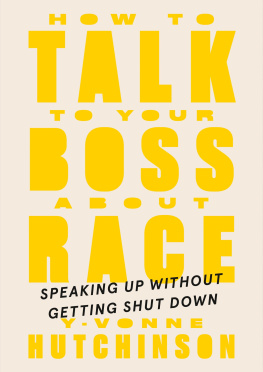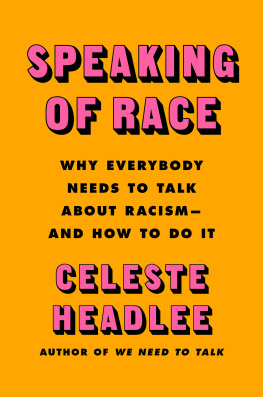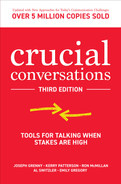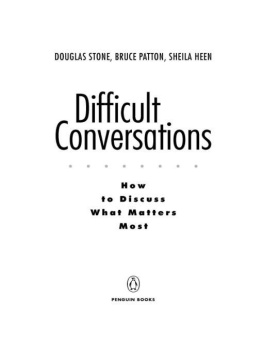Contents
Guide
Praise for
How to Have Difficult Conversations About Race
Kwame has a powerful, yet tactful and empathetic approach to having difficult conversations about race, diversity, and inclusionall topics that are now more paramount than ever... This book should be required reading for all people.
Rebecca Zung, attorney, Amazon bestselling author of Negotiate Like YOU MATTER, and high conflict negotiator
Kwames relatable storytelling style, combined with his expertise in conflict negotiation, helps professionals across industries develop the tangible skills needed to build the confidence to engage in meaningful conversations about difficult topics, and the empathy needed to communicate acrossand aboutdifference.
Tiffany F. Southerland, Esq., career coach, speaker, and host of the How Does She Do It podcast

Also by Kwame Christian
Finding Confidence in Conflict: How to Negotiate Anything and Live Your Best Life

How to Have Difficult Conversations About Race copyright 2022 by Kwame Christian
All rights reserved. No part of this book may be used or reproduced in any manner whatsoever without written permission of the publisher, except in the case of brief quotations embodied in critical articles or reviews.

BenBella Books, Inc.
10440 N. Central Expressway
Suite 800
Dallas, TX 75231
benbellabooks.com
Send feedback to
BenBella is a federally registered trademark.
First E-Book Edition: September 2022
Library of Congress Control Number: 2022013475
ISBN 9781637741306 (hardcover)
ISBN 9781637741313 (electronic)
Editing by Leah Wilson and Alyn Wallace
Copyediting by James Fraleigh
Proofreading by Becky Maines and Jenny Bridges
Indexing by WordCo
Text design and composition by PerfecType, Nashville, TN
Cover design by Brian Lemus
Cover image Shutterstock / teacept
Special discounts for bulk sales are available. Please contact .
To my family, thank you for the consistent love and support.
To my staff, thank you for helping to change the lives of millions.
To my clients and the people we serve, thank you for trusting us.
Whitney, Kai, and Dominic, thank you for your patience as I completed this project. After all the years of work, dedication, heartache, and pain that went into this, I hope that I made you all proud.
CONTENTS
The best things in life are on the other side of difficult conversations.
The American Negotiation Institutes guiding principle
T he topic of race and issues surrounding race have been coming up with ever-increasing frequency, and not just in the news and on social media. Conversations about race are also being held far more often in the workplace. As a society, we are more interested in racial equity than ever beforeand thats a good thing. But conversations around race also tend to stir up strong opinions and powerful emotions, and unfortunately, most workplaces are woefully unprepared to manage the ensuing awkwardness and conflict. This jeopardizes workplace harmony and makes it harder for colleagues to collaborate and coexist. It also makes it more difficult for people who are trying to address issues of inclusion and belonging within the organization to persuade and influence others.
People who arent used to talking about race and dont feel comfortable doing sobut find themselves in a position where they mustcan be particularly ill-equipped for these conversations. Even people used to talking about race often find these conversations challenging. The potential for awkwardness and offense abounds. But so do the opportunities for creating connection and solving problems. While weve made great progress as a society in terms of race, equity, and justice, we still have a long way to go. To solve our remaining problems, we need to be able to talk to one another about them.
Im the founder and CEO of the American Negotiation Institute (ANI), where we specialize in training and consulting in the realm of negotiation and conflict resolution. At ANI we believe the best things in life are on the other side of difficult conversations; its our guiding principle. In addition to our negotiation and conflict resolution work, we also conduct diversity, equity, and inclusion (DEI) training and strategic consulting centered on creating connection through communication and cultural intelligence. Weve had the opportunity to work with a wide variety of companies in different industries of every size that are experiencing DEI challenges. In the process, weve recognized an important issue: in the world of DEI, were not just dealing with a knowledge gap, were dealing with a skills gap. Yes, DEI programs should increase awareness and help people to understand diverse perspectives. However, these programs often miss a critical element: the ability to communicate respectfully and effectively about these serious issues.
Thats what this book will teach you to do.
My goal isnt to teach you how to think about race. There are already a lot of great books on the history of race and racism, structural inequity, and more. But although these resources usually do a great job of outlining the challenges we face, they often overlook the difficulty of bridging the gap between problem and solution. Both persuasive communication and conflict management play critical roles in whether meaningful change occurs in the workplace. How can you solve problems if you dont have the skills to talk about them?
THE FIRST DIFFICULT CONVERSATION
In 2020, America went through yet another racial reckoning. The latest in a string of police-related deaths, the most notable of which were Breonna Taylor and George Floyd, played nonstop on the news. What made this reckoning different was that, because of the global COVID-19 pandemic and resulting lockdowns, we could do nothing else but watch story after heartbreaking story about police shootings, hate crimes against Asian Americans, and racial inequity. They were all over traditional and social media, making it seem like everybody was talking about race.
Everybody except me.
Before starting the American Negotiation Institute, and before the career I had in between as a business lawyer, I worked as a legal and policy analyst at the Kirwan Institute for the Study of Race and Ethnicity. There, I focused on matters concerning health equity and criminal justice. I would travel the country talking to health professionals about growing health inequities, what they could do to address them, and more specifically, how they could create persuasive arguments to overcome resistance to change from their leadership, local politicians, and community leaders. For example, one of my focuses in the world of health equity was infant mortality, defined as the death of an infant before their first birthday. Did you know that out of every 1,000 Black children born, 11 die? This is nearly double the rate for White infants, which is only 5.8 per 1,000 births. There was no shortage of statistics like this, so helping health professionals address these persistent challenges is important and impactful work.
Next page

